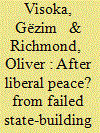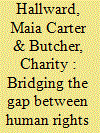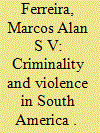| Srl | Item |
| 1 |
ID:
152739


|
|
|
|
|
| Summary/Abstract |
Attempts to build a liberal peace and a concurrent neoliberal state in Kosovo have not managed to produce a sustainable and emancipatory peace. Instead, they have produced a local and negative hybrid peace that has been co-opted by the dynamics of local state formation and state contestation. These dynamics have overshadowed a meaningful transition from ethnic hostility to sustainable peace that should encompass pluralism, security, law, rights, and liberal institutions. This article examines this emergence of a negative hybrid peace and explores the prospects for a more emancipatory peace based on a local pro-peace infrastructure that avoids the pitfalls of liberal peace in practice.
|
|
|
|
|
|
|
|
|
|
|
|
|
|
|
|
| 2 |
ID:
152738


|
|
|
|
|
| Summary/Abstract |
While the concepts of human rights and peace are increasingly linked in the study and practice of International Relations, there is great variance and inconsistency in how the concept of peace is discussed in the study and practice of human rights. We conduct an examination of the websites of human rights nongovernmental organizations (NGOs) affiliated with the United Nations Human Rights Council in Geneva, Switzerland, to explore whether and how human rights and peace are linked. Religiously-affiliated and women’s NGOs typically link these concepts, while non-Western NGOs stress peace over human rights.
|
|
|
|
|
|
|
|
|
|
|
|
|
|
|
|
| 3 |
ID:
152737


|
|
|
|
|
| Summary/Abstract |
This article aims to present the main challenges related to violence and crime in South America and to analyze how the Union of South American Nations (UNASUR) has responded. A content analysis of the official documents and minutes of three UNASUR councils is presented. The councils examined are the Defense Council, the World Drug Problem Council, and the Council on Citizen Security, Justice and Coordinated Action against Transnational Organized Crime. Notwithstanding its innovative bureaucratic structure, this research suggests that the structures of UNASUR have not kept pace with the growth of violence and crime.
|
|
|
|
|
|
|
|
|
|
|
|
|
|
|
|
| 4 |
ID:
152734


|
|
|
|
|
| Summary/Abstract |
The International Studies Association (ISA) hosts a growing group of scholars working on the intersection of international relations (IR) and Global South perspectives. ISA’s Global South Caucus dedicates itself to dialogue with IR’s mainstream, complementing efforts of scholars who have for decades been pushing theoretical boundaries. The caucus approaches Global South IR scholarship not in geographic or ethnic terms, but as rooted in alternate histories and empirical realities.
|
|
|
|
|
|
|
|
|
|
|
|
|
|
|
|
| 5 |
ID:
152735


|
|
|
|
|
| Summary/Abstract |
This collection of articles contributes to the growing body of research on how technology is affecting peacebuilding, peace and conflict studies, and research methodologies in the field. Assumptions about the use of technology for peace are interrogated, such as the purported deepening of inclusivity and widening of participation that technology provides to peacebuilders and communities. It frames the discussion from a peace-focused perspective, providing a response to the work done by others who have focused on the ways technology makes violence more likely. This supports a holistic discussion of the ways that technology can have an impact on contentious social and political processes. By expanding the base of knowledge about how technology can be used for peace and violence, we hope this collection increases the understanding of the circumstances under which technology amplifies peace.
|
|
|
|
|
|
|
|
|
|
|
|
|
|
|
|
| 6 |
ID:
152736


|
|
|
|
|
| Summary/Abstract |
The year 2015 marked the fifteenth anniversary of United Nations Security Council Resolution 1325 (2000) on Women and Peace and Security. This article analyzes the marginalization of the resolution’s prevention mandate in the theoretical and policy literatures. Our feminist analysis reveals that shortcomings in the policy arena are foreshadowed in conflict prevention scholarship. Conflict prevention research under-theorizes gender drivers of conflict, focusing excessively on cause/effect links at the expense of (gendered) structures of signification that make violence possible. Mirroring these gaps, the implementation of the conflict prevention mandate of 1325 fails to confront the war system and gendered forms of militarism and militarization. Nevertheless, the work of agencies and organizations outside the Security Council presents opportunities for long-term and systemic social transformation. We suggest that advancements in the protection and participation aspects of 1325 can strengthen its prevention mandate because together these provisions challenge the gender norms that are implicated in the occurrence, justification, and sustenance of violent conflicts.
|
|
|
|
|
|
|
|
|
|
|
|
|
|
|
|